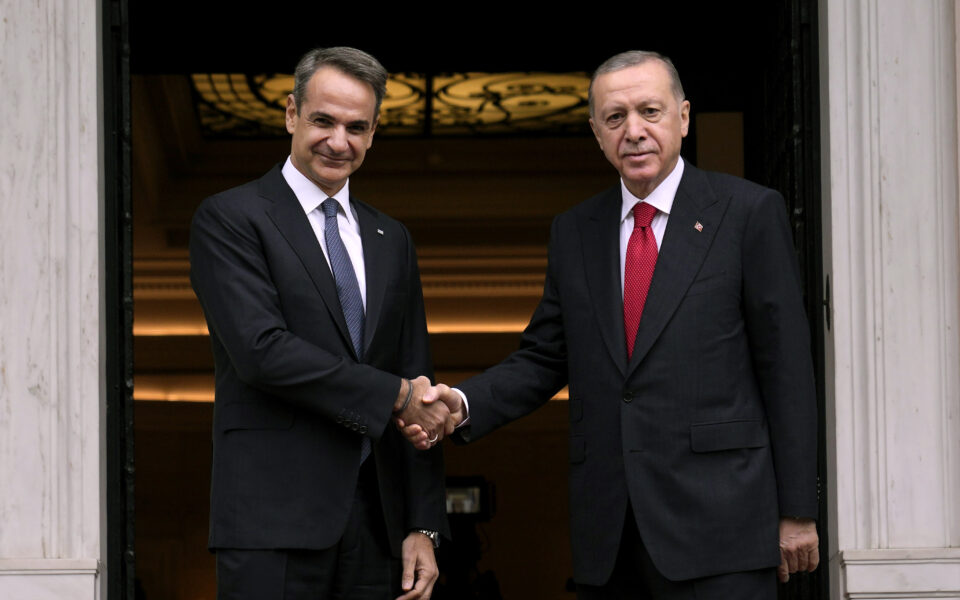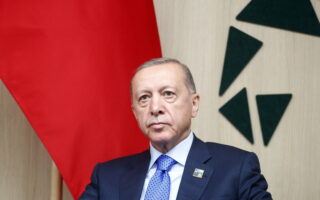What to expect in Athens-Ankara relations in 2024

Last year started with Athens and Ankara relations probably at the lowest ebb in years, but Turkey’s deadly earthquakes that struck weeks later and Greece’s response to the tragedy created a new backdrop for bilateral relations.
2023 ended with the two NATO allies agreeing to reboot their relations, establishing a roadmap designed to initiate a new era of closer ties during a landmark visit to Athens by Turkish President Recep Tayyip Erdogan.
“Geography and history have dictated that we live in the same neighborhood … But I feel a historical responsibility to utilize this opportunity to bring the two states side by side, just as our borders are,” Greek Prime Minister Kyriakos Mitsotakis said in a meeting where both sides appeared keen to repair their relations.
“There is no issue between us that is unsolvable,” said Erdogan. Only a year earlier, he had warned Greece that Turkish missiles can reach Athens.
In 2023 governments were re-elected in both countries, receiving a new strong mandate to deal with thorny issues, also regarding foreign policy.
Does this mean that we could see any substantial development in 2024? Analysts say we should hold a small basket. With Erdogan gearing up for local elections in March, quick movement on any of the sensitive issues is highly unlikely.
“This year is likely to mimic 2023, with Mitsotakis and Erdogan building on their momentum to continue improving bilateral ties with high-level meetings,” says Emre Peker, a Turkey and EU expert at risk analysis firm Eurasia Group.
This, Peker adds, will likely underpin continued stability in the Aegean and pave the way for more cooperation on select issues such as migration, tourism and trade.
Former Turkish diplomat Sinan Ulgen, a senior fellow at the Carnegie Europe think-tank, says that in 2014 we should expect a continuation of the rapprochement that has already been initiated.
In order to avert escalation, he says, “there needs to be an understanding that disagreements should remain contained to the diplomatic track and both leaderships should not use these and instrumentalize them for domestic purposes.”
Greek Deputy Foreign Minister Kostas Fragogiannis is expected to visit Istanbul on February 2, with talks focusing on promoting the positive agenda. His visit will include meetings with business leaders, according to foreign ministry officials.
On March 11, a meeting within the framework of the political dialogue between Greece and Turkey is expected to be held, led by Greek Deputy Foreign Minister Alexandra Papadopoulou and her Turkish counterpart Burak Akcapar, in preparation for a meeting between Mitsotakis and Erdogan, which is expected to take place in April or May in Ankara.
Implications for Erdogan
“Turkey’s foreign policy essentially changed in late 2020. Since then it has been trying to recalibrate its relationship with regional countries and neighbors,” says Ulgen.
He says a major reason behind the shift is the state of the economy, which leaves no real willingness to engage in more assertive foreign policy rhetoric that could undermine efforts for economic recovery.
To be sure, a rapprochement with Greece, if it proved to be lasting and genuine, would also have a positive impact on Ankara’s relationship with the West, the EU and the United States.
“Better Turkey-Greece ties will help Ankara maintain its foreign policy balancing act, but it will not trigger a major improvement of Turkey-West ties,” says Peker. “That said, it could help facilitate more transactional deals between Turkey and its Western partners. Erdogan’s push to secure a purchase of more F-16s and modernization kits from the US would certainly benefit from improved Ankara-Athens relations.”
Regarding Turkey’s relations with the EU, at the moment there’s absolutely no positive momentum on Ankara’s EU track, which means there is no EU leverage at all on Turkey’s decision-making or behavior, Ulgen says.
“Even if currently it is difficult to envision the revitalization of the accession track, having an opening that will incorporate the restart of negotiations for the modernization of the customs union, a track on visa facilitation and possibly liberalization would further consolidate the will in Turkey to protect the ongoing rapprochement with Greece,” he adds.
Peker believes that Turkey-Greece rapprochement will not impact Ankara’s domestic politics.
“Erdogan can easily orchestrate foreign policy U-turns to meet his political needs at home,” he says. “The co-dependency between his AKP party and his nationalist allies will provide maneuvering room for Erdogan to maintain good working relations with Mitsotakis. That, however, will also preclude Ankara and Athens from tackling longstanding issues, such as territorial disputes and Cyprus,” he says.





